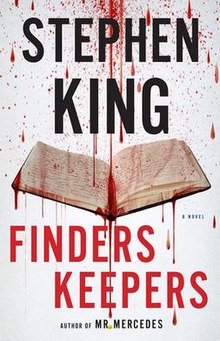 Finders Keepers reads almost like Agatha Christie's Hercule Poirot stories, in the sense that the main hero doesn't enter until late in the game. Only in this case the reader knows the mystery, and it's a lot bloodier. Though Finders Keepers is a sequel to Mr. Mercedes, it could almost stand as its own story. Bill Hodges, the hero of Mr. Mercedes, is a minor character here - important, yes, but not the focus. This is a strange story in that all of the major players don't actually meet one another until late, late, late. Finders Keepers is all set up and development - maybe too much - but always moving quickly, always entertaining, and thrilling, if predictable, in its conclusion.
Finders Keepers reads almost like Agatha Christie's Hercule Poirot stories, in the sense that the main hero doesn't enter until late in the game. Only in this case the reader knows the mystery, and it's a lot bloodier. Though Finders Keepers is a sequel to Mr. Mercedes, it could almost stand as its own story. Bill Hodges, the hero of Mr. Mercedes, is a minor character here - important, yes, but not the focus. This is a strange story in that all of the major players don't actually meet one another until late, late, late. Finders Keepers is all set up and development - maybe too much - but always moving quickly, always entertaining, and thrilling, if predictable, in its conclusion.The first part of the story alternates between its hero, Paul Saubers, and its villain, Morris Bellamy. Morris has no connection with Mr. Mercedes. We first meet him in 1978 as he robs and murders the famous fictional author, John Rothstein, out of revenge for selling out his Jimmy Gold character. Paul, on the other hand, in the present day does have a connection to Mr. Mercedes - his father, Tom, was crippled by the Mercedes that Brady Hartsfield drove into a crowd of job seekers that fateful day. The connection between Paul and Morris is the author, Rothstein, and what Morris stole from Rothstein. These early chapters, the entire book in fact, largely serves the plot. They are also meant to develop the character, but I didn't find any of the characters particularly engaging. They were pretty vanilla. In fact, I think one could describe this story as a whole as vanilla, but it is an entertaining kind of vanilla.
Without having read the third book in this series, End of Watch, I would think that this is an unnecessary story. Hodges and company (Holly and Jerome) from Mr. Mercedes, serve largely as deus ex machina characters in this book. King assumes we already know them well, and thus their development as characters is stalled. They are here to remind us of their existence, as is Brady (whose final chapter serves as an after-the-credits scene a la a Marvel superhero movie, whetting your appetite for the next chapter). Still, necessary or not, I found every page engaging and nothing boring, even if King probably could have reduced the story's length. I know that he likes to give readers a bang for their buck, but that doesn't means readers want redundant details.
What's most impressive about this book is the creation of the story within the story. Rothstein and his Jimmy Gold story felt like they could have been real, a sort of Catcher in the Rye. Perhaps it's less believable that a story whose character's main motto is "Shit don't mean shit" and "I'm not your birthday fuck" would be a major reading selection in high school, but you never know. It's impressive the way King integrates details of this fictional book series as if he was referencing a real book. Finders Keepers has a love for literature. Both Paul and Morris are lovers of fiction, and they often discuss their love for authors like John Cheever and Shirley Jackson, among many others. But it is Rothstein's Jimmy Gold trilogy that consumes their lives, to the point of behaving dangerously. King reveals the immersive power of literature through its power over its main characters - to the point that one of them becomes angry by an author's choices. Finders Keepers is also immersive, and though I feel he does Hodges a disservice, I'll refrain from making a visit to King's residence.
No comments:
Post a Comment